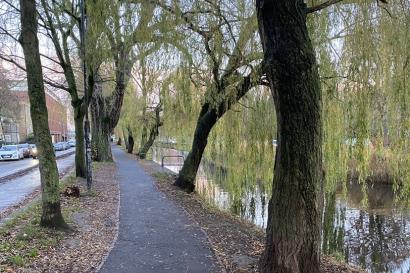When we were initially picking classes and forming our schedules in the first week of study abroad, I decided to audit a class on Irish film—I didn’t have to do any assignments, but I could show up to class, take part in discussions, and, best of all, watch movies! I really love movies and I think film plays a huge part in shaping our understanding of themes of history, the present, the future, various communities, etc.—how life is depicted in movies matters a lot. I compiled here all the movies we watched in class, including a couple that we took a trip to the theater to see, and rated/reviewed them. (Please note that all of what I say is totally and completely my opinion alone).
Michael Collins (1996)
This was our first movie, which depicts Irish revolutionary Michael Collins’ journey from the 1916 Easter Rising through the onset of the Irish Civil War. History buffs who want an uplifting story of revolution will enjoy this. I thought it worked to tell the story that it needed to tell, highlighting the violence of the time and the changes in direction for the Irish independence movement of the late 1910s/early 1920s. It was a pretty typical hero’s journey-type story, which wasn’t remarkable, but informative for someone unfamiliar with the history.
I also have to hand it to the casting director, as Liam Neeson does look a bit like Michael Collins, and Alan Rickman does bear a scary resemblance to Éamon de Valera. (And Julia Roberts’s Irish accent is, well… it’s alright I guess. It’s not like I could do any better.)
My rating: 2.5/5
The Wind That Shakes the Barley (2006)
This was a great follow-up to Michael Collins, TWTSTB was set in roughly the same era as Michael Collins, but with a completely different perspective. Starring Cillian Murphy, the movie follows a close group of family/friends in rural Ireland right after the 1921 Partition, with violence rampaging them as they join the IRA and start to fracture in beliefs. As outward as the fighting is, it starts to infiltrate their close-knit relationships, driving people who’ve known each other forever terribly apart.
This was a tough movie to watch, tougher than Michael Collins, I’d say, as it was less of a hero-villain story and more of an everyone-loses story. It really hammered home the devastation of war on communities, and how civil war can be a “brother fighting brother” environment—something I didn’t really grasp the gravity of until watching this film. I'd give a strong content warning here—there's a lot of violence in this movie. A lot.
My rating: 3.5/5
Brooklyn (2015)
Skipping ahead historically to the 1950s, Brooklyn stars Saoirse Ronan as a young Irish woman who emigrates to New York City. Eilis subsequently deals with the forces of homesickness, first love, and conflicted identity, struggling to integrate herself into this sprawling new country. The role of immigrants and immigrant cultures are a big part of the story, as she initially lives with other Irish immigrant women, and soon falls in love with an Italian-American man.
The romantic storylines were sweet, a bit cliché, perhaps, but understandable as well for the time period, and there is visible chemistry. Saoirse Ronan is stellar, conveying the emotions and demeanor of a woman discovering herself and the world in front of her while reckoning with other people’s perceptions of her and what she can and can’t control.
My rating: 4/5
Lies We Tell (2023)
This was a new movie that we went to the cinema to see. The movie is about a young Anglo-Irish heiress living comfortably in her Gothic estate after her father dies. That is, comfortably until her darkly mysterious uncle and cousins, all of whom she has never met, move in. Agnes O’Casey, an English actress with Irish heritage, stars and her performance is incredible. The movie was a very engaging thriller, which built up and up in a crescendo that kept me at the edge of my seat. It was an uncomfortable watch, too, given the rampant sexism and mistreatment of female characters, and I will give anyone who wants to watch a strong trigger warning for sexual harassment and sexual assault.
My rating: 4/5
Philomena (2013)
This movie depicts the real-life story of Philomena Lee, a survivor of the Magdalene Laundries and mother-and-baby homes. She collaborates with BBC journalist Martin Sixsmith to search for her son, whom she was forced to give up for adoption fifty years prior, and the two in turn become friends. The embark on this journey, discovering long-held secrets hidden by the abuses of history. Overall, this movie was sweet and Judi Dench's performance as Philomena is very tangible. It's funny at times, very uncomfortable at other times, and super informative for someone like me who wasn't familiar with this painful piece of Irish history. We also learned that the real-life Philomena Lee is still alive, and has become an advocate for adoption rights and has spoken out against the abuse she suffered as a teenager.
My rating: 3/5
Sing Street (2016)
Sing Street was one of my favorites! It’s set in 1985, where Conor (Ferdia Walsh-Peelo), a 15-year-old boy from Dublin navigates his dysfunctional family and a new school. He starts a band, which leads to him developing his style, meeting a girl (Lucy Boynton), and bonding with his music-loving older brother (Jack Reynor). There’s a ton of cool music and seeing the band’s evolution as well as Conor’s growing confidence in himself made this such a cool movie. Admittedly, I am a huge fan of ‘80s music and media, so I might be biased, but this was a very fun time. The soundtrack is unbeatable, and for the budget the movie had, they did an incredible job.
My rating: 4.5/5
The Quiet Girl/An Cailín Ciúin (2022)
An Cailín Ciúin (Irish for The Quiet Girl) is based on the novel Foster by Claire Keegan, and follows Caít (Catherine Clinch), a 9-year-old girl, who is sent to live with another family for the summer as her overwhelmed, impoverished parents are expecting another child and can’t take care of her in the meantime. It is set in 1981, in a rural area of Ireland that is primarily Irish-speaking, and so most of the movie dialogue is in Irish.
An Cailín Ciúin was, in my opinion, the best movie that we watched. Hands down. It was visually stunning, emotionally moving without having to say too much or have too much happen, and brought the strong themes of gentleness, parental care, and the role of secrets and silence. Catherine Clinch, who was ten years old when the movie was shot, gave a spellbinding performance. All of the accolades this film won, including an Oscar nomination for Best International Film, were well deserved.
My rating: 5/5. If I had a sixth star I’d add it.
Dance First (2023)
Dance First is a biopic of the celebrated Irish playwright Samuel Beckett, opening with him reluctantly winning the Nobel Prize for Literature and following him debating what to do with his prize money. It focuses on the women in his life, from his mother to his wife to failed flings, showing how he messed up or further doomed those relationships.
The performances and cinematography are good, but the story doesn’t have a ton of substance other than Beckett being a jerk to people and then regretting it, but it being too late once he does. It was kind of just him pissing people off and boo-hooing life, reaping few consequences, and then getting old. A cautionary tale, maybe? It was hard for me to tell.
My rating: 2/5
Handsome Devil (2016)
Fionn O’Shea stars as Ned, a 16-year-old music-loving, rugby-indifferent outcast, who goes to a new, rugby-obsessed boarding school. There, he strikes up an unlikely friendship with his rugby star roommate, Conor (Nicholas Galitzine), and the two navigate a myriad of characters, including various bullies, their eccentric English teacher, and a spiteful rugby coach. It’s a very sweet story, and it really shows how entrenched homophobia and toxic masculinity is in society and how it trickles down into youth, making them grow because of it or in spite of it. And the ending scene is electric – thanks, Rufus Wainwright.
My rating: 4/5
Herself (2020)
Sandra, a struggling single mother, is navigating a failing Dublin housing system after separating from her abusive ex, and ends up collaborating with her late mother’s longtime employer and a newfound community to self-build a house for her and her daughters.
This movie was written by Clare Dunne, who also starred as Sandra. We learned in class that the director, Phyllida Lloyd, had to convince an initially reluctant Clare Dunne to take the lead role, which I’m so glad she did, because Dunne’s performance is incredibly poignant. The movie is also incredibly authentic to the reality of Dublin with the layout of the city and places people like Sandra would have to live; it’s clear the writers did a great deal of research on the matter.
I have to give a strong trigger warning for domestic violence and PTSD, and there are many elements of systemic/legal abuse and sexism.
My rating: 4.5/5
Once (2007)
A classic movie set in Dublin, with many recognizable locations that I passed every day while abroad. A struggling Irish singer-songwriter busker meets a young Czech woman on Grafton Street and the two bond over their love of music, writing songs together and trying to make sense of the complexities of life. For the budget and equipment at hand, this movie did an incredible job. “Falling Slowly” is one of my favorite songs of all-time, the live performance of which made me tear up. It was a beautiful movie to end on, especially seeing so many sights of the place that I called home for almost four months, and me being an avid songwriter myself.
My rating: 4/5
Ezren Herzog
he/him -- I'm studying Creative Writing and Studio Art at Knox College, class of 2025! I mostly dabble in cartooning, poetry, creative nonfiction, portraits, and humor writing. Outside of my majors, I play guitar and electric bass and sleep a lot.







